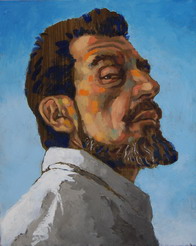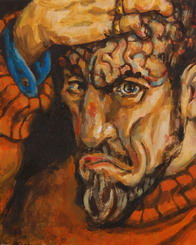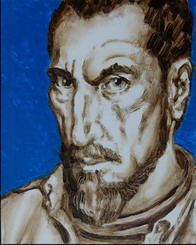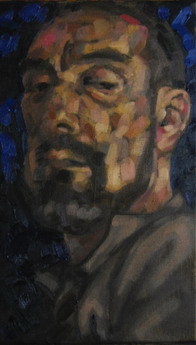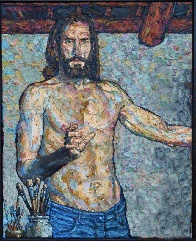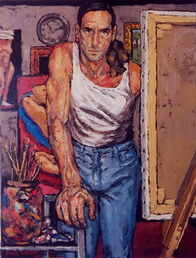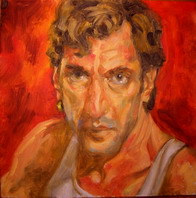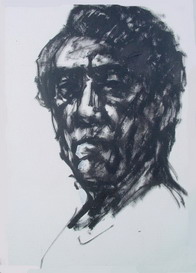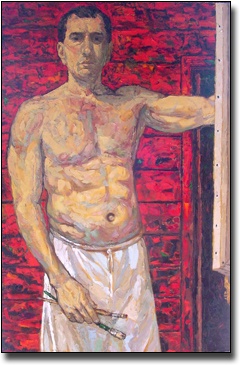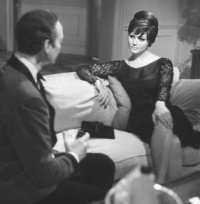The admittedly prudish influence on filmmaking of a 1950’s United States still trying to cast itself as good guy after killing more bad guys than the bad guys killed good guys in the second world war, had Niven make the only choice possible after succeeding in getting Claudia Cardinale’s character to try Champagne for the first time.
The wary virgin Princess does a ‘Letters to Penthouse’ reversal under its influence, offering herself lewdly (& in the only moment of verisimilitude between the character Cardinale plays & Cardinale herself) to the calculating & caddish sexual conqueror (old enough to be her… uh, uncle?).
He, none-the-less, being in the end: a decent sportsman who follows the Queensbury rules, doesn't exploit the advantage, instead- he puts her to bed fully clothed & waits for a level battle-field on whose turf he will wage his gentlemanly war on the morrow…
So what? Does this make me a hopeless Doris Day romantic? Or is, as I’ve implied elsewhere on the pages of this blog- the manipulation of one sex by the other, (always within the rules of courtesy & fair play) the real sport of kings?
addendum May 26: I have had comments that make me realize my last sentence (above) makes too much inference without enough data (!) This is what I meant: The word 'manipulation' does not deserve its strictly negative rap; manipulation of one person by another can be either bad or good, & seduction is a good example- all seduction (even when motivated by the purest love) involves manipulation... does that explain what I meant?
Shibumi (700 words)
As crass as the Japanese can be with their little-girl-undies fantasies & terrible cartoons; & as deep as is their aesthetic debt to China, they have, I think, a profound, sophisticated & unique sense of it- that is very different to our, occidental, tradition & attitude to aesthetics theory.
They have, one might say- apropos to the concept, a word to describe this aesthetic sense- which has no definition...!
Shibumi*- what a wonderfully elitist Word! But it makes sense to describe the experience of aesthetic appreciation, impossible in itself to describe in words, with a word that requires an understanding that goes beyond the definition of words with words.
In the world of contemporary occidental art every technique & possible intent or impact has a clever phrase that quantifies & defines it, making anyone who goes to class or reads the books, able to talk-the-talk without necessarily understanding the walk.
Here in Spain the same might be said of Flamenco or bullfighting, where every pass, every variation, every dance step, has a name but those ‘who know’ can declare “He has duende” (spirit, soul, art) or "Don" (gift, profound understanding) where he who doesn’t 'know'- merely looks foolish when he makes the same observation (like shouting òle at the wrong moment!) 'knowing' can be faked as little as it can be defined.**
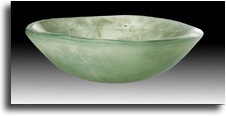
The Japanese vessel above might encompass the tenets of shibui- the essence of simplicity in that there is nothing left to remove. Nothing extraneous, even the pretension of a methodical care in its making that could easily have achieved any number of indistinguishably, perfectly- circular bowls.
Art without artistry.
Or as Kan'ami, the 14th century founder of the Noh theatre, said: I want to create a play where anything that could be added would make it less good.
I remember learning the word, shibui, in a high school English class & as part of my teacher’s cultural & linguistic challenge in describing its meaning to us, she used: imbalance, asymmetry. Not a bad beginning, I would say, but what is balance? If balance is simply symmetry, then the Golden Section or Fibonacci’s ratio can also be Shibui.
A traditional Renaissance composition made up of a beautiful Fibonacci nautilus-
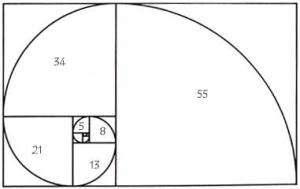
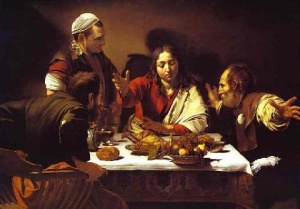
Like this example of the high Renaissance by Caravaggio illustrates, aside from the obvious Fibonacci spiral with its placement of the focal point of the composition firmly in the Golden section with every other element pointing in no uncertain terms to it; it also adhered to other aesthetic rules (that quantified the beauty in a composition) of the time: a seventh of the painting is the dark foreground (to draw the viewer through the mid & far-ground); a seventh of the canvas' light limelights the focal point...
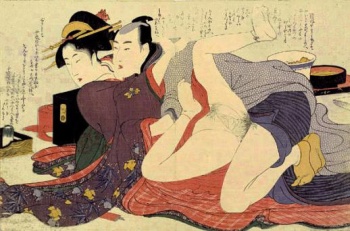
A cultured Japanese would undoubtedly frown at my using a sample of the great Utamaro's erotic work (above) in an essay about Shibui but its composition follows the precepts of the same culture.
I wonder at my ignorance's inability to breach the cultural divide (a true abyss of unfathomable depth & darkness!) while being easily & deeply moved by their aesthetic & expressive results.
Would that same, hypothetical, cultured Japanese, shake his head at my inability to choose between a good- badly made bowl, & a bad- badly made bowl? Just as I might his inability to grasp the genius in Rodin's Balzac holding his own erection under the famous robe? (Could be the symbolic incarnation, the very logotype, of French arrogance & vanity- not, I think, very shibui...)
I suppose that in our means of expression the two, i.e. occidental & oriental art, can intersect in these concepts but these same differences in aesthetic judgement also explain why the Japanese embrace the spontaneity & fealty of Impressionism more readily than the more finished Renaissance work with its culturally associated sense of romance & psychology (where we might laud Frans Hall's ability to capture the signs on a face of a debauched life, the Japanese did portraits that celebrated a sage & detached inscrutability) not to mention the symbolism of cultural myth like theology which is in itself a cultural trait regardless of one's personal beliefs.
footnotes from wiki-pedia:
Shibui (渋い) (adjective), or shibumi (渋味) (noun), is a Japanese word which refers to a particular aesthetic of simple, subtle, and unobtrusive beauty. Like other Japanese aesthetic terms, such as iki (below) and wabi-sabi, shibui can apply to a wide variety of subjects, not just art or fashion.
Originating in the Muromachi period (1333-1568) as shibushi, the term originally referred to a sour or astringent taste, such as that of an unripe persimmon. Shibui maintains that literal meaning still, and remains the antonym of amai (甘い), meaning 'sweet'.
However, by the beginnings of the Edo period (1603-1867), the term had gradually begun to be used to refer to a pleasing aesthetic. The people of Edo expressed their tastes in using this term to refer to anything from song to fashion to craftsmanship that was beautiful by being understated, or by being precisely what it was meant to be and not elaborated upon. Essentially, the aesthetic ideal of shibumi seeks out events, performances, people or objects that are beautiful in a direct and simple way, without being flashy.
Expert singers, actors, potters, and artists of all other sorts were often said to be shibui; their expertise caused them to do things beautifully without making them excessive or gaudy.
Today, sometimes baseball players are even said to be shibui when they contribute to the overall success of the team without doing anything to make themselves stand out individually.
The concept of shibui was introduced to the West in 1960, in two special publications of the American magazine House Beautiful.
In James A. Michener's book Iberia the word 'shibui' is referenced as follows: "The Japanese have a word which summarizes all the best in Japanese life, yet it has no explanation and cannot be translated. It is the word shibui, and the best approximation to its meaning is 'acerbic good taste'". Return...
Iki (いき, often written 粋) is a traditional aesthetic ideal in Japan. The basis of iki is thought to have been formed among commoners (chonin) in Edo, pre-modern Tokyo.
An iki thing/situation would be simple, improvised, straight, restrained, temporary, romantic, ephemeral, original, refined, inconspicuous, etc.
An iki person/deed would be audacious, chic, pert, tacit, sassy, unselfconscious, calm, indifferent, unintentionally coquettish, open-minded, restrained, etc.
An iki thing/person/situation cannot be perfect, artistic, arty, complicated, gorgeous, curved, wordy, intentionally coquettish, or cute.
Iki can be used for almost anything, but especially for people (and their personality and deeds), situation, architecture, fashion, design, etc. It always describes something to do with people, or their will.
Iki is not found in nature itself, but can be found in the human act of appreciating the beauty of nature. The most widely-known Japanese writer embodying iki is Haruki Murakami, who writes straightforwardly of idiosyncratic topics. Contrast Murakami with Yasunari Kawabata, whose work is firmly in the wabi-sabi tradition. Return...
**I am adding this footnote 3 years & 2 months (26/06/11) after writing this article because I have been reading Michener's fine study of Spain: Iberia. When Michener was grappling to define the word 'duende' he, like me but in the inverse, uses 'shibui' in the attempt. Here are some excerpts: "The Japanese have a word, shibui, & the best approximation to its meaning is 'acerb good taste' ... Architecture, landscaping, theatre, art forms, total personal appearance, conduct--all can be shibui if they only are properly acerbic, restrained & in the great tradition of Japan, but what the word finally means no one can say, for it relies on the soul of Japan which is in itself undefinable. Duende is a word like that, but since Spain is not a country given to acerb[ic] restraint the connotation is different ... A singer possesses duende if suddenly she can tilt her voice in such a way that everyone automatically cries ¡Olé! ... a bullfighter has duende when he displays not bravery but unmistakable class. ... duende is something that no man can will upon himself but, occasionally, when he is one with the spirit of a place or with the inherent quality of Spain, it rises from some deep resrve within him." return
Shibumi: Comments by Bobby Porter (with further comments by me in violet- 500 words)
Good word "shibumi", why is there a feeling of
satisfaction- even pleasure when one finds a word to encapsulate a
concept that is recognized but not articulated?
It maintains mystery; mystery that is the same magic that works so well for love- which is sometimes lost when the object of our love is known thoroughly…
It's like we don't really "own" a concept unless we have a label for it. I think this is a fairly recent idea and goes partly to explain a general loss of impact of the stand-alone visual image (without written exposition or context) in the visual arts- the change of thinking after the Reformation and the spread of literacy has given primacy to the written word (along with the overuse of visual images that the combination of photography and printing made possible)
Shibui is a concept (as I understand it from your essay) that is of course important to painters and yet it is not something that can be taught or that can be easily explained or deconstructed into rules of composition, it is more of an intuition and something that develops along with the work. Also it is more complicated than just a pure minimalist approach (less is more) but depends on the style, motivation and aesthetic of the painter and is just as true for complicated compositions as for simple ones (what would you cut out of "The Garden of Earthly Delights" for example).
I know what you mean but your example serves to point out our different points of view, though we agree in concept. Just as we paint differently, we like each other’s work, but we don’t make any attempt to change our work to look like each other’s.
I, like everybody, have a soft spot for Bosch just as the many childhood hours of searching out miniscule figures doing funny things in the Breughels’ paintings gives them a special warm place in the panoply of art for me; But I don’t consider either of these artists important in the history of art. Bosch especially only looks at the tiny detail he is working on & doesn’t plan compositions in a beautiful way (nor, do I think, does he find the composition’s beauty by intuition as the improvised & spontaneous work particularly valued by lovers of shibui do.) An ideas man, he illustrated thought instead of searching for beauty...
"Dynamic balance" is possibly an adequate definition but it is not just a balance of composition but also how that composition balances with the emotional and philosophical intent of the painting. I love that the word originally meant "sour or astringent taste" and developed from there to mean a "pleasing aesthetic", this suggests the importance of incorporating the "unsweet" to separate a dynamic beauty from the maudlin.
Also liked the word "iki", particularly the possibilities suggested by "not found in nature itself but can be found in the human act of appreciating the beauty of nature"
I have always felt the art lover capable of deep understanding & appreciation is an artist himself though he create nothing...?
The Oxford Project revisited:
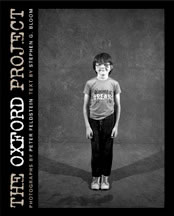
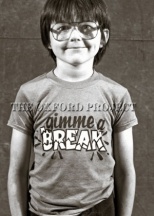
One of the first entries to this blog back in July 2006 was about Peter & Stephen's fascinating Oxford Project. I just received word from Peter (Feldstein) that the high-quality, coffe-table, book version* will be available in September (pdf press release here).
The Oxford Project is a national portrait of
overlooked triumphs and travails. In the faces and voices of these
strangers, we grow to understand ourselves better. They remind us of
who we dreamed we would become, and who we turned out to be.
—From the Introduction
by Stephen G. Bloom
So, almost two years later: Congratulations & best of luck to Peter & Stephen!
*From The Oxford Project published by Welcome Books. Photographs ©
2008 Peter Feldstein. Text © 2008 Stephen G. Bloom. Preface © 2008
Gerald Stern. www.welcomebooks.com/theoxfordproject
Return...
How to travel (400 words)
The fun in air travel was drained first by its spread into the mediocre, from catering to a thin, jet-set layer of society, to cheap tickets, old aeroplanes & tired, overworked & underpaid stewardesses who the airline is no longer even allowed to choose for being attractive.
And now: security; security that treats you like a criminal until you show otherwise & are then grudgingly allowed to repack the mess they have made of your baggage & put your shoes back on since they are satisfied the soles are not made of C4 (why do we even know what C4 is?).
Well, as many as may fill the ranks of airport security because of their spineless need 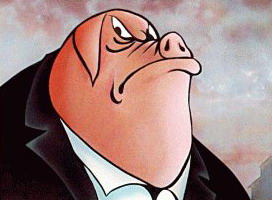 for
power or for the opportunity to safely display their innate sadism,
most have the very difficult job of doing what they are told to people
who don’t like it. The guard is working in a hostile
environment, people who feel a sense of injustice, or unjustified
intrusion, give the guard all the same clues, reasons for suspicion, as
someone who is trying to hide his guilt.
for
power or for the opportunity to safely display their innate sadism,
most have the very difficult job of doing what they are told to people
who don’t like it. The guard is working in a hostile
environment, people who feel a sense of injustice, or unjustified
intrusion, give the guard all the same clues, reasons for suspicion, as
someone who is trying to hide his guilt.
Whether you get a guard eager to flex his power or one who is simply tired of dealing with angry people- be a professional, follow the protocol: amiable but serious, open but respectful, cooperate without volunteering & return eye contact.
Make their job easier- carry no metal, not so much as tin-foil wrapped chocolate (unless it is in your duty-free bag). Wear flat shoes. Take your sunglasses off before walking through. Do not carry the limit allowed of liquids (contact lens solution, shampoo etc) carry none- they will have what you need where you're going.
Again, smile politely without trying to be friendly, look them in the eye & most importantly: Offer eager cooperation (they are as accustomed as they are resentful to be dealing with pissed-off people all day while just doing their job) but don't volunteer information- wait to be asked.
Keep things in perspective: during the two body-cavity searches I have submitted to in my life, as I bent over, I found that rather than feeling humiliated I felt sorry for the guy with the flashlight in his mouth & was keenly aware of how glad I was that our life decisions (his & mine) had him looking up mine instead I up his...
How Wang-Fô was saved
Travelling as much as I do I rent houses but leave them, I buy houses but sell them & I end up leaving a trail of belongings behind me, but not all- I do have a few places around the world I have sometimes managed to store my more prized possesions.
Since settling-in here in Spain I have rediscovered many old friends amid boxed objects, antiques picked up here & there, part of my collection of Japanese art & books, many, many boxes of books.
When I opened the box in which a collection of short stories by Marguerite Yourcenar has sat abouta decade I observed myself grab it & hastily clutch it to my chest like a child with a doll- an old favourite I remember well.
I read the first story in bed last night & read it again sitting in the sun this morning. Despite the time since I saw it last I found myself anticipating whole passages & enjoying my forgotten notes in the margins. After this morning's second reading I wanted to share it with an old friend but since I only have it in Spanish I looked it up at Amazon to order it for him only to find it has never been translated to English... it is 1:30 am & I have just finished, 12 uninterrupted hours dedicated to the task.
I'm sure I haven't done old Marguerite justice but it is such a fine story that I am sure its brilliance will shine through even my dismal mangling of her voice- 4000 words here...
Fish Memory (860 words)
I have been living in Spain for almost nine months now. After almost four years in Thailand it took me a month or so to scrape the rust off of my Spanish as well as to attune to the strong local accent here in Cadiz, but it wasn’t a day or two before I shrugged Thailand off & felt at home here. I am still far from what I have always run away from: the predictable morrow; or run toward: the unpredictable. Yet, I appear to have reached a point where I feel settled enough to have my first moments of nostalgia for the very pleasant time I had there in Chiang Mai.
I gave another television interview today & as we talked of Flamenco & bullfighting, my interlocutor surprised at my familiarity with the subjects*, I suddenly felt the Spanish Paul conflict with the Thai one- my pride & enthusiasm for the traditional ritual killing of a bull juxtaposed on the memory of another blood sport, a Thai one.
 In
the irrigation ditches that run between rice paddies the Thai find what
we know as Siamese Fighting Fish (Betta Splendens, I used to breed them
as a child). The wild fish are not like the exuberantly beautiful,
genetically manipulated, Chinese version one sees in jam jars on
shelves of pet stores everywhere. The real Siamese Fighting Fish have
smaller fins & belligerent bulldog brows & are bred for size,
strength, speed & aggressiveness instead of diaphanous angel fins,
though like everything Thai, their colours are as brilliant &
saturated as the Chinese version.
In
the irrigation ditches that run between rice paddies the Thai find what
we know as Siamese Fighting Fish (Betta Splendens, I used to breed them
as a child). The wild fish are not like the exuberantly beautiful,
genetically manipulated, Chinese version one sees in jam jars on
shelves of pet stores everywhere. The real Siamese Fighting Fish have
smaller fins & belligerent bulldog brows & are bred for size,
strength, speed & aggressiveness instead of diaphanous angel fins,
though like everything Thai, their colours are as brilliant &
saturated as the Chinese version.
Many Thai men are as passionate about the little fish as Spanish men are for Canaries. Meetings are held, usually outdoors, where dozens of men turn up with
their collections of little jars and/or a gambling stake. They
then gather in a tight group with a cooperation that allows all to see
that would be impossible for American men (their kinespheres are too
large) around the jar the two fighting males are joined.
Meetings are held, usually outdoors, where dozens of men turn up with
their collections of little jars and/or a gambling stake. They
then gather in a tight group with a cooperation that allows all to see
that would be impossible for American men (their kinespheres are too
large) around the jar the two fighting males are joined.
It is not a fast & furious fight like one between cocks, the 6 or 8 cm fish circle & spread their gill flaps. In nature, barring overpopulation, the display would be enough to chase off the one whose territory it wasn’t; in the jar they are forced to follow through on the threat & over a period of two or three hours bite & rip at each other’s fins & will continue until the death which comes once one hasn’t enough fin to propel himself in water.
Though small & far from mammals, the exhausting battle seems to me as bloodthirsty as any other & yet, typically, the gentle Thai Buddhist shows a unique saving grace in these affairs: the owner of the losing fish is expected to recognize his fish has lost & concede before the fish is so badly hurt he will die. A gentility akin to Walt Disney who worked hard to film the chase but never showed the kill. If the owner fails to stop the fight in time (losers are dropped back into the irrigation ditches) he is fined 100 Baht, about 2 Euros, 3 dollars, a significant sum to a rice farmer.
Like Jose Antonio, my interviewer today, though he asked pertinent questions I gave clear answers to, I could see he couldn't get his head around this idea of travelling, or more precisely: of moving my life from one place to another repeatedly instead of deciding what I liked best & settling down. I'm sure he could relate to & sympathise with, the excitement at the thought of the aeroplane trip that takes one to someplace unknown for a holiday but not in the staying instead of coming back to the home base- the real world- after.
Where I lost him is in this question of predictability, the despair that enters my heart when I realize I know what tomorrow will be like because it will be the same as yesterday. Why despair? Well, I am not sure but I think it has to do with noticing that when something is repeated, washing dishes, brushing teeth, for example, it actually does make a memory but it doesn't matter how many times it is repeated or for how long, it only makes one memory. When not brushing my teeth I can indeed remember vividly, if I chose to, what it is like to brush one's teeth but I cannot remember any particular instance of doing so like I can the first moment I set eyes on a girl I fell in love with or the time a car got out of my control & smashed into something though the hundred other rides that got me there without incident are blurred into one memory...
The only thing I'm sure of is I find other people's interest in such things as astrology, psychic or palm readings, strange, not so much because of the doubt any of that can ever be right, but because not knowing the future is the best part.
*As foreigner here, I am a ‘Guiri’, in Thailand I was a ‘Falang’ Return
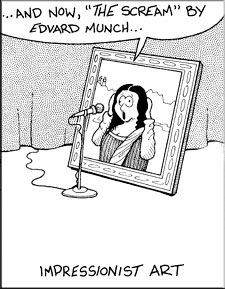
The artist & his relationship to his work (2600 words)
Once again an exchange of e-mails about art theory with my friend Bobby, the painter, has inspired a line of thought that has manifested as an essay which, I am here, beginning.
I have devoted a great deal of my reading time over a good many years, to reading about artists as well as just about anything written by artists, even including many whose work I don’t admire (Picasso might be a good example, a sophisticated art theorist & facile creator of good aphorisms, but though I recognize him as great artist I happen not to like his work*).
The writings by artists remembered by history vary from poetry to journals, essays, books, transcribed lectures & collections of letters, which in Vincent’s famous case to his brother as well as other artists, provide insight into intimate thought (as opposed to meant-for-publication or at least: public view) including, fascinatingly, a detailed & clearly described evolution of his colour theory (sometimes even with smudges of the colour he referred to) over the development of his career, albeit brief.
Insight into character, personality, mood, attitude, inspiration, working methods & many other peeks at the artist nothing else, including his work, might give us.
In Vasari’s case his writing actually & consciously gives us, within an admittedly verbose, adjective-heavy & tediously religious prose, a contemporary history & personal description of the high Renaissance’s most important artists.
An observation evolved on its own over the years of this kind of reading, it came to me unbidden, primarily interesting at first, simply as the only example of something all the artists I read had in common; it was: strong intelligence. Which isn’t to say there aren’t brutes & villains among them, indeed, they are in generous relative evidence, but clever brutes & villains, even when unsuccessful in their brutishness or villainy.
Once the idea had migrated to my frontal lobe I began turning it over & came to the conclusion that though it wasn’t a trait unique to painters & sculptors, neither was it a necessary pre-requisite of vocational success even among others of the arts. To a dancer, for instance, one might say a lack of trained intelligence in speech or thought might even be a tribute to that artist’s sacrifice to the endless hours of disciplined practice it took to turn his body into an artistic expression. Indeed, one might even argue he, the dumb dancer, is practitioner of the purest form of art, since it is limited in its existence to a spontaneous & unrepeatable present.
And yet, I thought to myself, the phenomenon of higher than average cognitive processing abilities, shared by visual artists, must have certain significance. I suppose also the amount of time a painter, sculptor, writer, spends alone while working gives him more time to think than some other labour might.
I will, until someone makes convincing argument or shows me the disproof by exception: take this shared trait as my first premise whose relevance will become evident a little further along.
I once convinced a young man of my acquaintance to read books. He was a very smart young man (who could, for instance, boggle me with his knowledge of theoretical maths or with his intuition for chess, & who is, by the way, still smart, just no longer young!) who had not, none-the-less, discovered the richness reading provides one’s life.
“It's all on the Internet! The Web’s faster. Books are obsolete” To which I said: There was a man named Tolstoy. Tolstoy was an extraordinarily smart man, surely smarter than you & I combined & I know you, at least, are pretty smart. He lived to a ripe old age despite having to carry around his very large brain & was, furthermore, of a privileged class that offered him a fine education, stimulating conversation with other good minds & all the time in the world to dedicate to rumination & exposition. He used his genetically superior, environmentally honed smarts, to consider a few philosophical questions & was able, due to his longevity, to do so for a good many years, at least in human terms. Don’t you think someone as intelligent as you should be smart enough to dedicate the few hours it would take you to read the conclusions all this cumulative, efficient, thought came to?
But he stuck to his guns & answered: But I can look Tolstoy up on the Net & get the essence of his thought in minutes instead of many hours. It was then I pulled the trump card that finally made him waver: Aside from the depth of Tolstoy's philosophy & his insight into psychology & human character, he is remembered as one of history’s pre-eminent writers, with Ana Karenina: even the father of the modern novel. Don’t you think he was perfectly capable of being as precisely concise as necessary in his choice & number of words to express his own ideas? Indeed, I think, he must surely have been history’s greatest Tolstoy expert! **
By the same token I find Jansen, writer of the still influential University text-book used to teach art appreciation, wrong. If painters, like Ashkenazi Jews, are smart & any serious artist considers art theory unceasingly throughout his no-retirement career, aren’t his conclusions more important (in regard to the what & why of it) than anyone else’s?
“But there haven’t been two painters in the history of man who could agree on anything!” Well yes, it does seem that way sometimes, & yet when you read enough, certain thoughts that side-step fads & intellectualism, reappear amid the chaotic & ethereal whole. Unbroken threads such as ‘beauty’ stitch the bag-full of ideas together.
Here are a few of the things I have heard many times repeated by otherwise different people who describe themselves as painters or even artists though, in my opinion, the statements give away the fact they are instead, amateurs. I will defend my reasons after the list:
(1) "I hate to sell them, they are like my children!"
(2) "Why would I buy artwork?" (Smirk) "I am an artist!" (Aren’t-you-silly, shake-of-the-head smile)
(3) "The talent for painting is a gift from God."
(4) "I am a real artist: I can only paint when I am inspired."
(5) Anyone who cannot describe a person with reasonable accuracy after having been with him for ten minutes.
(6) "There was a time I didn’t know what I was doing but now I know exactly what a painting will look like when finished, before I begin it."
(7) When, for example, looking at a photograph of an artist’s work he comments that it belongs to his own collection (that is: of the artist).
(8) "I am an artist at heart but I had to be sensible/responsible/smart & choose to do something that isn’t so difficult to make a living at."
(9) Perhaps not exclusively but often: anyone capable of living in a house whose walls are hung with his own work, unless it is constantly changing with his output…
How I rationalise this list:
(1) I think the common amateur sense of one’s paintings (or sculpture) being like ‘one’s children’ -- the simile presumably referring to a long gestation & painful birth that binds one to the produced object -- withers in the face of serious work, that is: some years of a minimum of forty hour weeks. The mistake stems from the aficionado’s (as opposed to professional painter) confusion over where the talent lies: on the canvas or in his hands.
While still amateur, for lack of practice, the breakthroughs in painting insight can easily be mistaken for chance & a sense of ‘having been lucky with this one’. This feeling is that which makes the beginner feel he doesn’t want to separate from his finished work which may be a unique witness to his genius. Though I would bet an extremely few subjects of this feeling indeed are.
(2) “Why would I buy artwork?" (Smirk) "I am an artist!" (Aren’t-you-silly, shake-of-the-head smile)”
No true artist, even one as original, inimitable & different to every other artist in history, such as Jack the Dripper (Pollock), would have claimed his as the only valid form art takes. He both admired many other artists, & recognised that even if his work proved to be the single most important in the history of art, there were others whose sublime canvases he could never hope to equal even if he were to devote himself to trying.

Furthermore, shouldn’t a painter who feels others ought to love art well enough to buy his own work, also love art in general well enough to collect art himself? If you are a stereotypically poor painter reading this & wondering where I expect you to get money for such luxuries, I would say you are also very likely a good example of just how cheaply good work can be purchased! To the artist, unlike most but not all collectors, the love of art should be such that purchasing these examples of man-made beauty to live amid should not even be considered a luxury but rather, a necessity.
(3) An artist who only paints when inspired hasn’t the time to learn his trade. Like a carpenter honing his tools between jobs, a painter paints uninspired paintings when uninspired, but he paints & he learns. Doesn’t it seem arrogant to you if a painter feels he needn’t dedicate the number of hours at the minimum everyone else does in their respective trades? Besides, there is no arguing the fact the muses visit those who work, more often than those who lie around waiting.
(4) The talent for painting is not a gift from God or biology or anyone or anything else, it is learned through hard work, harder for some than others, just like any other endeavour.
(5) Why should an artist be able to describe a person he has had short acquaintance with better than others can? Not for any reason of Rudyard Kipling-like memory retention*** but because it is, in fact, more the painter’s job to observe than any other of the multifarious activity involved in creating paintings. It is above all the painter’s job to see, to understand his surrounding’s physical form, in shape, composition & colour, better than other people; it is thus he becomes able to point out the hidden beauty in their surroundings to those who look at his paintings.
I remember as a young painter looking fervently at my canvases knowing they fell far & away below my unique inner vision of beauty but could not for the life of me figure out where I failed. Now, many years later & after much practice, I feel exactly the same way.
Though my paintings are better than they were back then & I ‘see’ better, I know my inner vision will always seem clear to me before painting, only to reveal its nebulous areas in the act of pinning it down. There may be pursuits that can aspire to perfection, a mathematician’s equation perhaps, but in the pursuit of beauty perfection is out of the question & there is always more to learn.
At my age now, instead of feeling the frustration I felt when younger & saw where I failed without being able to put my finger on the ‘why'- now that I know so much more I only hope my inner vision will always be partly nebulous because my search embraces more than its capacity- & that it also continue to be way ahead of my hand’s ability to make it manifest so that I shall never have reason to lose my enthusiasm for trying.
(6) The painter who knows exactly how the painting will look when finished is ready to look for another job! Why? Well, let’s examine what it means when a painter reaches this stage. One might be forgiven thinking it means the painter has reached a zenith where his paintings are perfect expressions of his inner vision. As we saw in number 5 though, the problem with this explanation is that a sincere artist is always learning to see better, to understand beauty better (as per his job description) & so his inner vision must needs change & develop also.
What has actually happened to this hypothetical painter, is that, at some point, like so many in an artist’s career, one has a periodic, or sporadic, breakthrough (more for those who work whether inspired or not) that changes all of his future paintings. It may even take the form of being a very near expression of an earlier ambition. Either his vision hasn’t progressed or he is playing it safe, security in the form of knowing he can repeat what he has done while simply changing the subject of each painting instead of the experimentation that opens him to the risk of an unsuccessful painting.
But it is this very element of experimentation that breathes life into each new painting. Some of my paintings are as heavy as sculpture because the painting I chose to keep, the one on the surface, covers three or four failed paintings, but none I didn't learn from.
(7) The artist who collects his own work is a dilettante because artwork only becomes part of a collection when someone has purchased it to add to a collection. While still in the artist’s property it is merely stock.
(8) You may be an art lover at heart but you can be an artist at heart as little as you can be a physicist, mechanic or surgeon. Without the devotion, sacrifice & discipline it requires you are just a might-have-been.
(9) The writing of these thoughts began with a mention of the e-mail Bobby & I exchanged on the subject of the artist’s relationship with his work & so I will conclude them by going back to that same discussion: The first letter was mine, written after discovering a pile of drawing pads that had become, inexplicably, wet. They were mostly filled with my drawings. Though I was irritated to find a still unused pad of expensive, hand-made, watercolour paper warped, I flipped through the ruined drawings with emotionless detachment & indifference; though I remembered drawing some of them quite sure they were outpourings of supreme artistic genius! Then I flipped a page &… my heart stopped- it was a drawing Bobby had done placed loose among the pages to keep it safe until I had it framed, pen & ink, irrecoverably damaged.
Why would a sincere artist with an attitude of principled respect for his own work, an artist with a real sense of the monetary value of the work he sells, lack a covetous & proprietary sense of ownership of his own paintings while being distraught over the loss of one in his collection? (As defined in number 8 as, therefore, not his own work).
To a sincere artist, one committed to the interminability of the road to beauty, every finished painting inevitably shows him all her faults, while every future painting is without exception, a perfect manifestation of a perfect inner vision. And so, the most important painting he will ever do must always be the next one.
footnotes:
* I suppose I say ‘might’ because I do like some of his work, but then, any collection of such unprecedented number of pieces (50,000 by some estimates- fully 100 times the average artist’s career output) must perforce hold some gems… Return
** Not long after this conversation I bought him Siddhartha by Hesse & he still reads books to this day. Return
*** Kim Return
Response to The artist's relationship... (above) (1560 words)
Bobby's response with my comments below, but I think it
is time we gave Bobby a face, don't you agree? Here's a self-portrait,
a little larger than life size painted in  acrylics on hand-made paper. If you click on it you will be rewarded by a visit to his Web-site (in a new window).
acrylics on hand-made paper. If you click on it you will be rewarded by a visit to his Web-site (in a new window).
Perhaps I should tell you a little something more about him in order to intrigue you: When Bobby was a young artist, just a kid really, though a tough one, he was so taken by his first exposure to a Tibetan Tanghka that he decided to go to Tibet to learn how to paint them. He checked the sun & headed east; he didn't have a car, or money, or even luggage for that matter. He hitch-hiked, he took trains, he stopped & did labour to pay for food & shelter. It took him a couple of years travelling like this before he found himself apprenticed to the court painter in Dharamsala while the Dalai Lama, still unknown in the occident, lived & slept in an adjoining room. An interesting fellow...
A thought provoking article. I found it interesting that your criteria for validating an artist is based on the painter's attitude rather than on the finished works.
But I didn't, the article is about the artist’s relationship to his work not about validating him as artist- that, as you say, is in the work. In my opinion the list represents a few of the mistakes in attitude which seriously limit the painter’s ability to become artist. The opposite is not true; a sincere painter with a healthy attitude is by no means guaranteed a production of important art.
I think that is justified though, in the end, the work must eventually validate the attitude (at least to those other than the painter himself). I refer you back to one of our previous discussions on what constitutes art when I wrote "art is what an artist makes".
A clever & lovely phrase that must make any artist smile but it is a specious argument because it uses the word it defines in the definition. I would refer back to the mention of Duchamp whom that phrase brings to mind, in: What is Art? Part I, because though I am in awe of his elegant literature (albeit in translation), his deep art theory & original concepts, I consider his ‘artwork’ an impertinence! Entirely lacking in what I would deem essential in artwork of any form: beauty.
It seems that self "validation" is of particular concern to painters, more so than other artists (or most other professions for that matter). Maybe because other art forms have more of an in-built quality of entertainment; one can be entertained by music concerts, literature, dance recitals etc. but it is seldom an attribute that one expects from a painting exhibition, at least not in the same way.
Not in today's climate but going to the opening at the Academy in Paris was a night out on par with any concert, Opera, ballet or theatre up until the late 1880s... but even then- what percentage might enjoy a rock concert today, as you say, but be bored by Chopin & confused by Coltrane?!
I would say that more than
‘entertainment’, it is a question of idiom, of language,
since Freud, Picasso, WWI, it has become difficult & unrewarding to
understand the language well enough to bother engaging with it. I
mean, since the beginning of the 20th century, the definition of art
(which you & I have tackled without definitive results in these
very pages) has become so un-pinnable that the person without a
personal interest (like the painter) is demotivated to learn a language
as difficult to obtain as his only reward, the ability to enjoy a large
canvas painted in a single tone of black!
When there is no social consensus as to the definition of art, as there
hasn’t been for nearly 100 years now, it is natural the painter
suffer the greatest self-doubt. I think it is common, for
example, that someone uncultured, uneducated in the why’s of a
brown portrait of an old woman by Rembrandt, (why it is actually so
much more) will show respect to the first violinist of a symphony
orchestra even if they don’t understand or appreciate the type of
music he dedicates himself to. While in the company of a painter,
however, he feels perfectly within his rights to comment: “I
don’t know much about art but I think you should paint kittens
playing with balls of wool on blue backgrounds instead of portraits of
people who aren’t even attractive…”
The brief & superficial education in art appreciation they may have had in high school (Dalí, De Kooning, Klee, Kandinski, Warhol)
was so confusing they do not trust the painter as a professional;
though they recognize the trained dexterity of the violinist’s
fingers even if it is only put to the questionable purpose of imitating
a caterwaul!
So do we create
paintings to reach out and communicate or is it to fulfill some inner
need (or confront some inner demons). I think it depends on the painter
with some kind of sliding scale between the 2 positions.
Yes, a pertinent question, it seems to me, & probably one you & I knew the answer to back when we were wise & immature twenty-year-old painters! But in the end I believe art is essentially a language that requires speaker & listener. The whole art 'as personal expression' (“audience be damned!”) attitude, only surfaced when the idiom became idiolect.*
When I was at university one of the big ideas in the Fine Art Department was "self-expression" , if this was achieved then the work was a success. I never entirely bought into this, not only did it seem somehow overly narcissistic, but also limiting, I see painting as way to tap into a more suprapersonal space. Also, a good painting is as much about objective observation as it is about subjective expression.
Yes, I agree. (We touch this subject in What is Art? Part II) I think one can, for instance, speak to a viewer of a painting with a highly personal language such as that of the canvas painted entirely with the same tone of black but one can’t write poetry with such a vocabulary.
As to your 4th point, perhaps the talent is the state of mind that gives the painter the obstinacy, the self-involvement, and the obsessiveness to keep at it.
More a neurosis than intelligence then?!
Your 5th point, an important one. What the painter acquires is an awareness of the patterns and meta-patterns that make up our visual universe and hopefully too, an awareness of how these interrelate to the patterns of nature, social relationships etc.
* Fine word, eh?! I learned it from Bill Bryson’s recent Life of Shakespeare-
Such as the particular choice of the 20+ thousand words that make up, with a certain preference for phrasing, Shakespeare’s 200 plays, sonnets & epic poems.
(Bryson’s book was fascinating & though I don’t think I can imagine '20,000 different words’ in real terms they do seem few, don’t they? At least for a man who infused our language with coined words, words put to new uses & magical combinations that though literally nonsensical generate certain images or feelings in all who hear them & phrases which are now part of our common speech. I think I am correct in remembering that he is the most often quoted precedent for word usage in any English dictionary. This, as Bryson points out, when one of the early dictionaries, published during the Bard’s life-time, spelled the word ‘dictionary’ two different ways on the title page!) Return
Egon (700 words)
I just got my new super-computer with drive-in-movie sized screen set up. It was organized by my old friend & computer guru, Miguel, & I now have unprecedented power at my finger-tips! A gazillion miniature electronic slaves slavering & panting in their eagerness to serve me. What fun!
Miguel taught me how to plug in my first computer about eleven years ago when he was just a nineteen year old virgin, now, at thirty, he has an impressively successful business of his own & is widely recognized as number one geek in his hometown of Marbella.
He had the luck of being fat, bespectacled & socially marginalised as a child & therefore spent its entirety before a computer screen thereby avoiding the necessity of university for a successful career & has, furthermore, lost the excess weight but not his ability for binary thought & intimate communication with the miraculous/diabolical machine.
I have also acquired a new dog I have decided to call Egon after the hugely talented Austrian draughtsman: Egon Shiele, who did more great work before he died at 28 than most artists do in the length & breadth of 70 years of trying, would you like to see her?
 I
put word out in my town that I needed a medium sized, short haired
bitch & about a week ago was introduced by Maria Angustia
(anguished Mary), the owner of a nearby bar, to Paco, a local farmer
who offered me one of his six dogs. She’s not short-haired, as
you can see, but was so perfectly scruffy in every other way I
couldn’t reject her.
I
put word out in my town that I needed a medium sized, short haired
bitch & about a week ago was introduced by Maria Angustia
(anguished Mary), the owner of a nearby bar, to Paco, a local farmer
who offered me one of his six dogs. She’s not short-haired, as
you can see, but was so perfectly scruffy in every other way I
couldn’t reject her.
I followed Paco out to his pig & horse farm (gorgeous Andaluz horses & ‘black footed pigs’ as they are called in Spanish (de pata negra) which, on a diet of acorns provide dry cured ham of surprisingly delicate flavour) I in my car, he on his old motorbike. Upon reaching the farm we ran the gauntlet of the six dogs each tied to a tree strategically placed so no villain could possibly make it to Paco’s possessions or family without setting off the barking machines.
As it happens there are no villains in this village & yet every house has bars on every window however unreachable, tradition? Or is it the security that prevents young men from becoming villains? From my experience of villages around the world villainy is simply not an option as secrets are impossible to keep & no-one can get away with dishonesty, spend ill-gotten gains, or use stolen merchandise without the entire village knowing & yet Paco (short for Francisco) repeated a dozen times during my short visit: Ladra, ladra, (barks, barks) as the single recommendation he could think of since dogs, to him, only merit feeding if they complete this function.
She had spent her entire eleven months or so of life tied by a two metre chain to the same tree, summer & winter, & when I asked what her name was Paco looked at me confused & answered: Nombre? Pa’ que? (Name? For what?) she would live out her life at less than two metres from the lemon tree to which she was tied, there would never be cause to call her, why would anybody in their right mind name a barking machine? Amazing they keep their good natures hu?
After checking her teeth, temperament & general, visible, health, I said: Yes, I’ll take her. At which Paco untied her, picked her up & took her to the boot (trunk) of my car. I said: No hombre, en el asiento trasero (no man, in the back seat) he looked at me wrinkling his nose & asked with disbelief: Inside the car? I looked at my filthy car covered in country dust inside & out & answered: She’s more likely to get dirty from the car than the other way ‘round! This, being a pig farmer, he could understand & he threw her into my back seat. Country folk...
Since then it has been fun for me to see her, a nearly full grown dog, many cautious firsts: indoors, meat, up stairs- very cautiously indeed because behind each step might hide an abyss she could fall into...
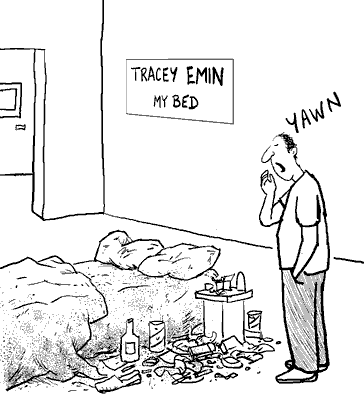
I just passed 20,000 visitors beginning October 2006 (when I added a counter)- an average of 1335.06 visitors a month, not worth a mention in the big league but I am pleased as many as that are interested in my Site, my work, my thoughts: thank you.
Memories of my father II (3550 words)
My papa was a rolling stone
Where he laid his hat was his home,
And when he died
All he left us was: alone.
THE TEMPTATIONS
I once lived in a tiny, ninth century hamlet of about twenty houses lost high in the mountains of southern Spain. There was no commerce of any kind in the village, the four old men & two old women who remained (their families dead or fled to the outside world) scratched the earth, fattened pigs & bullied goats for a living.
The town’s only public light was a naked & doleful forty-watt bulb that swung from its wire at the entrance; there were no telephones. The skies were huge & at night: a black unpolluted by human lights but filled with a swirling myriad multi-coloured stars.
During the long & arduous winters, (among other things: hours dedicated daily to sawing & chopping olive & oak as hard & dense as iron in exchange of the deep pleasure of heat & magical flame for one’s labours) not so much as a bug disturbed the silence. Indeed, the silence could become so imposingly palpable that sitting on my terrace looking out at the mountains on a crystalline autumn day, a patch of glistening Mediterranean shining 75 kilometres away in a breach between two peaks, I sometimes felt compelled to stomp a foot, or snap my fingers, just to be sure that sound as a concept hadn’t been abolished since the last one. And yet, if I listened hard enough, the silence was made more real by the faint background sonance of the rushing river 500 metres, as the stone falls, down in the valley below.
The culture in these tiny & ancient villages strewn across the mountain range & isolated from the outside world by a geography that made exposure to the nearest urban centre a three day donkey ride, the trail being too challenging to a horse, (& only passable during the summer months), almost to the end of the twentieth century when roads, electricity, telephones, cars & that great obliterator of culture: television, finally arrived. I have travelled & lived in enough different cultures to be a quick study for customs & manners but, like any culture, it took me years to get an inkling of its deeper foundations: How feuds & marriages between forty generations of a handful of families living in the same place without outside stimuli shaped their dour natures.
I noticed that anyone in the village (or the slightly larger neighbouring villages) will say hello to anyone they cross paths with & I quickly took up the custom (to pass without saying hello is to make a big statement) but noticed it wasn’t working for me. The village people would look at me with unsmiling faces & walk past without returning my salutation. I was upset by this & wondered if it was because of a prejudice or mistrust of foreigners, my long hair, or simply the fact that for some reason beyond my ken, they found cause not to respect me.
It was a while before I figured out the truth- I waited until the person walking toward me was at a distance where I could comfortably see their eyes before offering my greeting. But upon closer examination I realised they didn’t offer a hello until they were almost shoulder to shoulder with the person walking in the other direction. My slight variation introduced in a millennia-old tradition actually disconcerted them & as soon as I began doing it correctly everyone replicated.
Not an outgoing or easy-smiled people it took me a long time to earn the respect of resident among them. Because of so many generations of families interacting with the same handful of other families, strange social anomalies grew. Not only is the village idiot understood, accepted & even taken care of by the town as a whole but also the drunken wife-beater or the one who generation after generation has been called the ‘Trasto’ (the Thing- doesn’t sound the same in English) & it is accepted he steals, slashes the tires of people he is angry with, is drunken in public- early in the day, he cheats & lies… shrug of the shoulders: it's the Trasto, whatareyougonnado? And he got away with what no other villager could.*
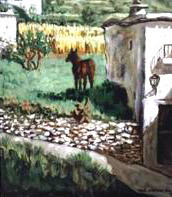 I
had rented the house sight unseen in a place I had never been because
it had fallen in my lap (at a very convenient price) when I was looking
for a place to escape London’s fast approaching & grim
winter. In the end I stretched my meagre resources to a year & was
happy to see the easier seasons before leaving. I spent the time with
the luxury of plenty of art materials & no distractions, dedicated
to trying improve my work & I succeeded in an immersion I may never
have equalled. When I left, it was with almost thirty bundles, mostly
paintings, sure I would never come back but I ended up going back many
times, once with my father.
I
had rented the house sight unseen in a place I had never been because
it had fallen in my lap (at a very convenient price) when I was looking
for a place to escape London’s fast approaching & grim
winter. In the end I stretched my meagre resources to a year & was
happy to see the easier seasons before leaving. I spent the time with
the luxury of plenty of art materials & no distractions, dedicated
to trying improve my work & I succeeded in an immersion I may never
have equalled. When I left, it was with almost thirty bundles, mostly
paintings, sure I would never come back but I ended up going back many
times, once with my father.
My father was a man who conducted his life according to his own rules, his own reasoning & principles & was, as often as not, as sure of his own unique conclusions as he was unperturbed at being the only human on the planet to have reached the correct ones.
As a young man he had boxed with a good deal of success, during his short career he
won most bouts by knock-out & held the British title, no, in those
days it wasn’t the United Kingdom but still: the British Empire,
so he was the flyweight champion of the British Empire, now that sounds
better, doesn’t it? And yet he had always painted, always loved
art, which is a true mystery as he was brought up with his five
brothers & sisters by a husbandless & ill equipped mother on
the streets of the Gorbals, Glasgow’s legendarily dreadful Jewish
ghetto, where boys grew up fighting & coin was rare; it had no time
for such frivolities as art. He painted before, during & after his
boxing career & told me many years later: I always felt a painter
in the ring.
Looking back on the varied experience of his life a clear pattern emerges: he was only happy when he was miserable. He did his best work when he hadn’t food for his children or shelter to offer his family. I am of the opinion the truth lies not so much in his being an artist in the ring as in his being a fighter behind the easel. Comfort only threatened to obfuscate his need to fight which was his motivation in any endeavour.
When my father was about fifty he found himself back in London, repatriated after escaping the Communist take-over in Laos, with a very young Lao wife & a baby, my youngest sister: Ponim (means: soft-shelled crab) whom he had purchased from a prostitute for 4000 Kip, about 2 American dollars. After some years of penury, hardship, council flats & the humiliation of government help, he opened a restaurant. A very odd decision indeed because, though he was a talented cook with a natural palate & a Sybaritic love of food, he disliked eating in restaurants & seldom did things he disliked.
He had opened it at a bad address, taking over what had been a Fish & Chip shop on the wrong side of London- the notorious cockney East End. A short time after opening, however, the restaurant became an extraordinary success, top in its category in all of London. Within a couple of years he was booked months ahead, took reservations from all over the world, won the best Thai restaurant awards & it wasn't unusual for him to have limousines circling for lack of parking while their owners ate.
He had enjoyed the challenge of all the multifarious problem-solving involved in making the restaurant work & in simply achieving his aims but by the time he was sixty-five & earning more money than he had since his boxing career forty years earlier, he fell into a terrible depression. He had no objective understanding of the value of money, was more than a little disgusted at handling it physically & he was generous with it, genuinely generous, as he didn’t consider giving it away a sacrifice.
His depression stemmed from having won the fight & found himself therefore, in sorry lack of one to replace it, he said to me: It is as if I have finished a painting & am being forced to retrace my every brushstroke over & over again. Although he was an introspective & solitary man (painting is solitary work) whom I had seen enjoy depressions many times, this time was different, I actually feared for him.
He hadn’t painted in years & so I spoke to him of
Rembrandt’s late work (my father’s favourite among all
painter’s paintings). I spoke to him of how his sixteen year old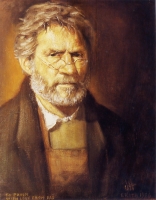 daughter no longer listened to him nor needed him-- he had succeeded
there also: the only one of us four children he had determinedly stuck
around to bring up. I talked of his wife whose alluring innocence while
still an adolescent in a tiny village lost in the wilds of Laos, had
turned to middle aged ignorance- her pretty face marked by greed-lines.
They had found a way to work together but were no longer a couple in
any romantic sense & my father decided I had a point: he only knew
one way to live & if he didn’t still have a few more lives to
experience the only one left was hardly worth the living.
daughter no longer listened to him nor needed him-- he had succeeded
there also: the only one of us four children he had determinedly stuck
around to bring up. I talked of his wife whose alluring innocence while
still an adolescent in a tiny village lost in the wilds of Laos, had
turned to middle aged ignorance- her pretty face marked by greed-lines.
They had found a way to work together but were no longer a couple in
any romantic sense & my father decided I had a point: he only knew
one way to live & if he didn’t still have a few more lives to
experience the only one left was hardly worth the living.
He divorced this, his third wife, taking a respectable bankroll in cash & the tiny Rascal van with miniature wheels he had used to do early morning shopping at the meat, fish & vegetable markets for the restaurant. The rest, property, bank accounts, business & vehicles, he signed over to his wife because, as he explained to me: The restaurant won’t work so well without me & she will need it.
Sure enough, a few short years later, Nah Gong sold it to someone who turned the celebrated & successful restaurant back into a take-away fish & chips shop though Gong was able to retire to big-shot in the small village she came from & the life of a Queen, or at least the version of Queen's life an ignorant, uncultured & entirely egoistical mind is capable of conjuring.
I was living in California at the time but met Dad in London to pack the miniature van to the last cubic centimetre with his belongings & head south. Among the bundles: Imported Spanish cane to make reeds for his bag-pipes, surely the first man ever to take Spanish cane to Spain! We went overland (instead of the 24 hour ferry that circumvents France) which I was glad of but there was no stopping in Paris or Aix en Provence for a gourmet meal nor nights in charming hotels when travelling with my objective-focused father. We took turns driving & sleeping & arrived at my village in very short order, despite the size of our wheels, at two or three in the morning. The last bit of road, however, a recently & roughly cut earth path through the woods that zig-zagged at a dizzying grade some three or four hundred metres to my house; was too much of a challenge for the Rascal van.
At this hour the village was quiet & everyone slept. We decided that it was the weight of the baggage that impeded our attempt & we emptied half I would come back down for after putting him to bed. But it still wouldn’t go up though its little wheels scraped & tugged valiantly. Illogically, in retrospect, we emptied the rest… but the little van that could, just couldn’t.
By then the sun was just coming up & I looked at my father, 65 years old, tired, dirty, sitting on a rock on a dirt path in a country whose language he didn’t speak, having just abandoned a life & family that had been his seventeen years- looking at his entire estate piled on the ground before him… the black cloud that descended over his features was all but visible. I roused myself deciding it was now late enough, or early enough, to go to a friend’s house & borrow a vehicle to move the stuff & get my Dad to sleep. We fell into our beds without washing & enjoyed a large but largely silent breakfast mid-afternoon.
When we’d eaten our fill my Dad lit his pipe filling the room with the aroma, now nostalgic to me, of his Balkan Sobranie tobacco while I lit a joint. When he calmly announced: I’m going to Italy. I knew him too well to argue. “Florence?” “Florence.” “When do you want to leave?” “No rush. Whenever you've finished eating”
We re-packed his van & I enjoined him to enjoy the trip, about three thousand kilometres through three beautiful countries, much of it either coast or mountain roads. “You’ve got plenty of money, all the time in the world, no cares-- stop at nice hotels, see the sights; enjoy the voyage.” We hugged & on the third morning after his departure he called from Florence; if you remove 8 hours in 24 for sleeping, 3 days hardly leave time enough to stop at red lights. He was disappointed; as I was to discover for myself a few years later, the Florence of my childhood was now a walled museum within a sprawling Metropolis. Despite its medieval walls no longer being surrounded by gorgeous Tuscan countryside it is still, to me, the most beautiful & civilized city in the world. Dad complained also of having made the rounds of old friends only to find them dead or gone.
On the sixth day after leaving he was back, & not long after that he bought a house in the same village of about four hundred houses I had bought mine in, becoming the second foreign owner after me in its long history. Unfortunately it also made him neighbour to the afore-mentioned Trasto, the Thing.
I told Dad how the Trasto could be a real & large inconvenience in his life if he didn’t handle him properly. I told him of one of my few confrontations with him, The Trasto chose to ask me from the other end of the small, dark & yellowed tobacco shop which also served as bar, in front of all the old men sat at their glasses of wine-- the heart & conscience as well as judges in that society-- when I would pay him for the job he did at the town hall’s behest of installing counters for our water so they could, for the first time ever, charge for its consumption. I answered: When you come back & do it properly. The conversation quickly deteriorated to him shouting, face flush with wine. I ignored what he said to answer quietly & calmly: Would you like to step outside so we can discuss this like men? To which he looked back at his glass of wine & said no more nor ever again referred to the botched job (which I paid someone else to do again).
There are no secrets in a village such as this & though everyone may feign disinterest, in fact, everyone wants to know everything about each other. They watch to see if you pay your debts (& in a small village where for centuries few escaped- credit is forced on you as a way of making you a client), if you wear clean clothes on a Sunday, if the area in front of your house is kept clean. If a stranger arrives here & lies, cheats or is dirty (the worst insult they offer) the entire village will know & treat him with a lack of credence & respect. If, on the other hand, the stranger is friendly, generous, doesn’t count his change or look at the scale while they weigh his produce, they do not reach the conclusion he is a nice or decent man but rather a fool who deserves the losses his foolishness invites & in these hard mountains the attitude is- caveat emptor.
I finished with: The only way to integrate successfully is to be just & honest but wary. Do not put up with anything your neighbours wouldn't put up with from you, even if it doesn't really bother you. Show you merit respect & the friendships will come in time. He looked at me with disgust at my cynicism & didn’t complain of late night noise or the Trasto’s kids (the eldest of whom is officially the Trasto today, his father having weakened into wine-sodden old age) playing ball against his door. Instead, he introduced himself & gave imported sweets to the children.
There were other outsiders living in the villages of these mountains, some English, many from Madrid who made a small foreign community similar in good & bad to a family. I introduced my father to some of them & he would knock at their doors before leaving on one of his frequent trips to London to ask if they wanted him to bring something back for them. To which they answered almost invariably with: Tea, some good English tea. This lead my father to the logical but incorrect conclusion (being new & not speaking the language, he didn’t distinguish between the cosmopolitan Madrileño & the backward local) that despite tea being unavailable it was what the people who lived here wanted (the still more logical truth was that it was unavailable because they neither wanted it nor knew of its existence). Back from one of these trips he knocked on the Trasto’s door & with a proud smile offered a bag of loose tea to the Trasto’s wife; brought all the way from the shop on Drury Lane with its inimitable aroma, collected & blended by housing centuries of tea in wooden barrels.
Not long after, when they coincided outside their right-angled doors, the Trasto courteously invited him in for tea. His wife prepared it by packing it into the Espresso coffee pot & served it to him thick & black in a demi-tasse, then sat opposite to watch him drink it, undoubtedly now finally convinced these foreigners are truly nuts.
Later he made the mistake of letting Trasto know he would be away for a couple of months. My father had proven himself so weak in the Trasto’s eyes that he didn’t hesitate to use the time to build an extension to his house, partly on my father’s land with a roof which out of sheer stupidity, butted against & drained into, my father’s metre-and-a-half thick walls (made of stone & earth mixed with lye as mortar) turning the long wall of his studio into an indoor fountain during the winter. On another occasion Trasto’s kids broke in & vandalized his house with unusual efficacy, ripping open his tubes of hand made paint, spreading his pigments, breaking his books & shitting on the floor before leaving…
My father was so sickened to find his home in that condition upon his return that he left without ever coming back & his third ex-wife sold it after he died. I am sure the Trasto felt justified in his opportunistic actions by the mere fact he got away with them in the end.
Despite his deep intelligence my father understood people as badly as they understood him but intellectually, he tried. I remember him telling me: When you meet someone new it is important to gauge his self-respect because if you offer him less than he has for himself, he will suffer, while if you offer more- you will.
* In the village where I bought & restored an ancient house, there were two brothers lame of mind like so many who share this tiny gene pool. Just as everyone there has a nickname he is known by, though no-one will say it to his face. The community had evolved appropriately simple-vowelled names for the siblings: Dido & Dodi. They were the sons of the village blacksmith, himself somewhere taxonomically between Gorilla & Homo Sapiens. I always thought of his forge as an illustration by Goya for a Dostoyevsky novel. It was unlit except for the insipid rays that seeped in through a tiny window & the light of the glowing embers of his coals & molten metals. His eldest, Dodi, about 35 or 40 with a couple of incisors missing & a habit of constant nervous guffaws as if with some inner amusement at the world, worked the bellows.
The extraordinarily rough products that came out of this forge fascinated me as a kind of naïf art & I would sometimes think up projects for him & sit in his forge & watch him work. There were no neatly stacked bars of steel or plate here, as in modern forges, just piles of chunky iron scrap. Regardless of whether I asked him for hand-forged nails or a frame for a leaded glass window I wanted to make, he always started with a block of iron. He would bang away on his anvil in that dark & hot atmosphere & from time to time would turn & give Dodi a resounding slap, CRACK!—just to get his attention—then command: faster! Or “Slower!” & Dodi would laugh his Goofy laugh: Hu- hu- hu & work the bellows faster, or slower… Return
page 5
Links to post titles:
P'sMW- page 1
Four ducks | A painter's style | Thinking with Google | The Vulture's Throat | Tortures of the
Damned | Memory and self | Hinduism and me | The Barber | Glasgow Smile | Airports | False advertising | Buttons | Govandhan pooja | Mean Streets | Population | Back in New Delhi | Buskers | Science and Philosophy | Happiness and Theory of
the Mind |
Boat races in Sarasota | Would
you
kill yourself to go on living? | More Happiness | Theo Jansen's kinetic
sculpture |
ebooks
and writers | Arthur Ganson | Thai politics | Misanthropy | Dying | Googling our minds | Knowledge transfer |
TEDTalks | Viggo | A study in ideal form | Fables | The Ant and the
Grasshopper | Conceptual Art |
The importance of
punctuation | California, first impressions | India | Conspiracy theories |
I love you; thanks’; you’re welcome | Errata | Fear | Egon & the other animals | A note about price:size ratio in paintings | Strange tales |
P'sMW- page 2
Christ’s
devil | Timelines | Life's funnel | Souvenirs | Moon Myth | How chaos was subdued in the Japanese
genesis myth |
Noah Lukeman and the murky world
of today’s book publishing | Morality and religion | Music and Love | Temeris Mortis |
The Dream | Peace | God's
Tick | Old Man (short story) | Intuition | A Curious Fact |
P'sMW- page 3
Why Humans prefer
other Humans to be like themselves | A letter to painters | Why do people talk? | The Painter's Eye |
I'bn al Alhí's treasure (short story) | Associative Personality Disorder | Love
poems, death poems | The Golem | Elitism in Art |
Theory of the Mind | Death Scenes | Politics
II | Rock
and Roll | Words
II- more words | Words |
P'MW- page 4
Confidence | How to steal
from gullible artists | Priests behaving
badly | How to make a
painting | Oats and
history |
A
note about signatures on paintings | Bob
Dylan | Number of
atheists among scientists | Theoretical
physics and me |
Faust
and Mephistopheles | Children's
reading habits | How to get
good photos of firework | The
20th century |
Further
Dialogue on the 20th Century article (above)
with comments by Bobby Porter | Love
is | Civilisation |
Martial Art as
Sport | Blind Boy Fuller | Becoming an
artist | Insomniac notes | Mind-brain | Age | José
Tomás | Black Adder |
This is not a Blog
P'sMW- page 5
Dammit! (final comments on the article Karma without metaphysics)
Laic morality (comments on Karma without Metaphysics)
Karma without metaphysics
Chivalric ethics
Shibumi
Shibumi: Comments by Bobby Porter
Oxford Project revisited
How to travel
How Wang-Fô was saved
Fish memory
The artist’s relationship to his work
Bobby's response to The artist’s relationship to his work
Egon
20,000+
Memories of my father II
P'sMW- page
6
Men
and Women | Girls: come closer
and I'll tell you a secret about men | Catholic Spain | Art is | Bad luck |
Dogs are the Best
People | Tough Love | Dense, intense and
condensed: a short love story | Cubans, Norwegians
and me |
From the
Guggenheim to Santiago's tomb | Memories of my Father | Ecco il uomo | Divorce and
maturity |
Inspiration
and process | Bulls and men |
P'sMW- page 7
Truth
and beauty | Bugs as food | What is art? part
II- Is modern art, art? | A
painter’s thoughts about self-portraits |
The Piraha of the
Amazon jungle | Thailand: stories
P'sMW- page 8
We'd be better off without Religion | East
Meets West | Thoughts
on Memory | Scared | Frank
Zappa |
Art
and Dreams by Ilene Skeen | Indoctrination | Rush
to change names in Isaan | The
Artist and Emotion | The
art critic |
What
is Art? Part I | Note
of introduction added to the Masculine/feminine article | Rebuttal
to Raymond S Kraft |
P'sMW- page 9
I'm back! | Masculine
versus feminine, Muslim versus Buddhist | Driving
with Muslims or Buddhists | Peter
Feldstein and Stephen G Bloom's Oxford project | How to
argue | On
'happiness', in answer to Ivan's comment | Thoughts on Happiness |
The birth of Chiang Mai | War Story | Happiness Versus Suffering | Cogitations
upon observing the life of an ant, from its birth to its death by old
age, while I lay in a bathtub. June 10, 06
The God Blog 1 of 11 | Art-Q quiz! 1 - 2 - 3 | Victor Herman- paintings | Animation | Privacy Policy |
What every artist should know about copyright | Contact Form | E-mail

